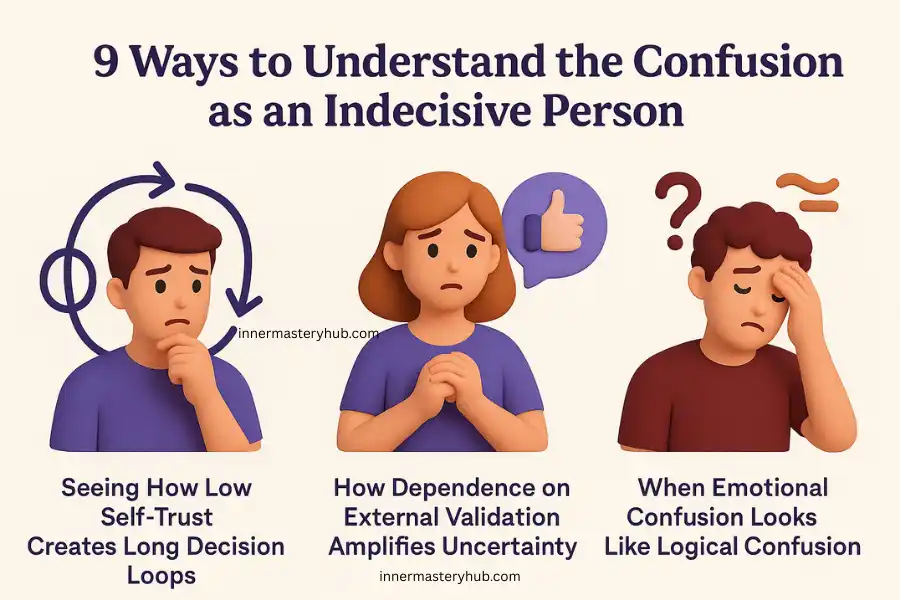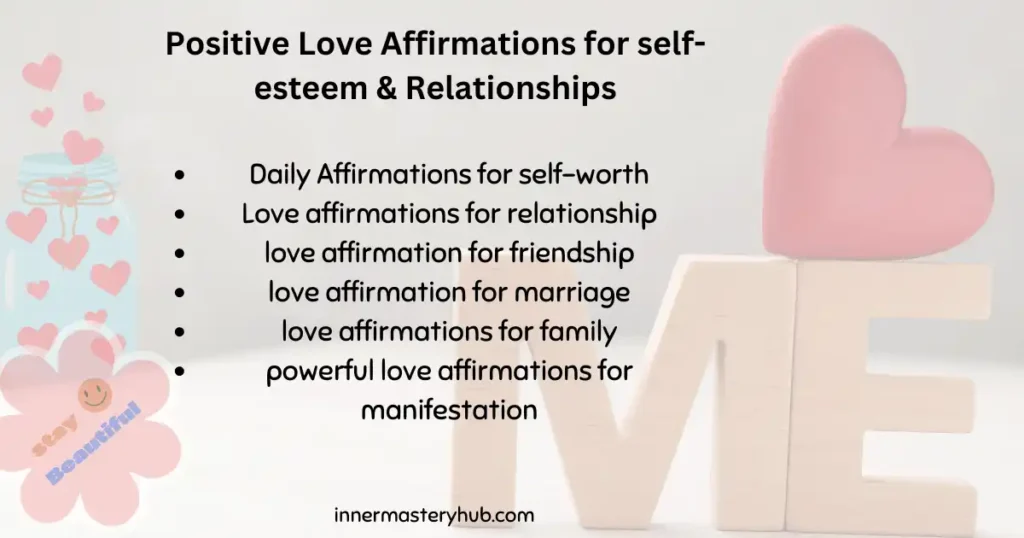Overcoming indecisiveness 12 powerful ways to stop silent suffering

Indecisiveness can stall your life. You want to move forward, but choices seem heavy. The uncertainty, fear, and internal conflict keep you frozen in place. In this article, I explain 12 practical ways you can use—after first showing how the problem grows and worsens.
Why does overcoming indecisiveness challenge you
Indecisiveness begins with the belief that a decision must be perfect. That belief makes you seek all possible information, avoid errors, or wait for certainty. Meanwhile, doubt, fear of judgment, and regret haunt your mind. Over time, that hesitation becomes habitual.
Research indicates that high Indecisiveness is associated with increased anxiety, reduced decisional confidence, and difficulty tolerating uncertainty. For instance, studies of decision boundaries show that reducing the complexity of how long you delay decisions can improve outcomes. (PMC) Also, indecision is not simply a trait you’re born with: about 20% of adults identify as indecisive—suggesting it’s a learned pattern that can change.
When you build habits of delay, overthinking, and fear of consequences, you trap yourself in a cycle of decision paralysis.
How things get worse without Overcoming Indecisiveness
The longer you wait, the more the weight of the decision grows. You imagine all the “what ifs,” magnify risks, and replay past mistakes. Every delay makes each subsequent decision feel harder because you reinforce the idea that “I can’t decide.”
You may also drain mental energy. In fact, making many small decisions (or lingering on them) reduces your capacity for bigger ones (“decision fatigue”). Distractions tempt you—busywork, research, seeking advice—all to avoid the core decision.
Eventually, you may avoid opportunities, settle for mediocre paths, or take too long on even trivial choices—the cost: regret, lost time, and diminished confidence.
Overcoming Indecisiveness in 12 Ways
Here are 12 concrete approaches you can try. You don’t need them all at once—pick a few, practice, and build momentum.
1. Limit your options
When the field is wide, your mind stalls. Narrow choices down to 2 or 3 real options. Use your core criteria to eliminate extras. Simplifying reduces overwhelm and lets you compare meaningfully.
2. Use a time limit
Set a deadline for making the choice. For minor matters, maybe 5 or 10 minutes. For bigger ones, a day or two. The limit stops endless rumination and forces you to act.
3. Embrace “good enough”
Perfection kills decisions. Aim for a solution that meets most of your criteria. Accept that no decision is flawless. Use the 80/20 principle: if 80% of your requirements are satisfied, go.
4. Focus on facts, not fears
Write down what you know (cost, benefits, constraints). Avoid “might” or “what if” statements. Use objective data to compare options. That anchors you to reality, not catastrophizing.
5. Commit to reversibility
Ask: “Is this decision reversible or adjustable later?” If yes, decide faster. If you can change course, the pressure lessens. You give yourself room to adapt.
6. Build decision experience via small trials
Practice with low-stakes decisions: what to eat, which route to drive, which book to pick. Each small choice builds the “decision muscle.” Over time, bigger ones feel easier.
7. Limit outside opinions
Opinions help when you’re stuck, but too many voices drown out yours. Ask one or two trusted people, not ten. You remain the final judge of your situation.
8. Reframe regret as feedback
If a decision leads to problems, treat that as data—not failure. Ask: “What can I learn? What can I adjust?” That shift reduces fear and makes decisions less final.

9. Watch your internal voice
Your self-criticism or doubts often hinder your decision-making. Listen: “I will mess up,” “I’m not smart enough.” When these arise, label them (“just fear”), counter them with past wins, and proceed anyway.
10. Use decision momentum
Once you make one choice—even a small one—use it to fuel the next. Each step forward reduces the inertia. It’s easier to keep moving than to restart from zero.
11. Chunk big decisions into steps
Significant choices can paralyze you. Break them down into smaller parts: research, compare, select, and test. Focus first on step one, not the entire mountain. That makes progress tangible.
12. Practice tolerance for uncertainty
Accept that no decision comes with perfect knowledge. When you hold some uncertainty, allow it to be. Recognize that part of making decisions is managing ambiguity. Over time, your tolerance grows.
Putting It All Together
Here’s a simple workflow you can adapt for Overcoming Indecisiveness:
- Define your decision clearly.
- List 3–5 core criteria (your values, constraints).
- Narrow options.
- Set a time limit.
- Gather objective facts (step 1).
- Evaluate the pros and cons based on those facts (step 4).
- Choose a direction.
- Take a small step (test if possible).
- Review outcomes; adjust as needed.
Use this pattern for both small and large decisions.
Unique Perspective, “Decision Confidence Buffer”
I propose the idea of a decision confidence buffer: accept that the first decision may lack complete confidence, but give yourself a margin (buffer) to act anyway. Think: “I am 70% confident—that is enough to start, and I will refine.” That buffer protects you from thinking in extremes, such as ‘perfect or nothing,’ and allows action to begin even when confidence is incomplete.
How to apply change: a 5-step process
Here is a simple process to uproot these behaviors and steadily build decision confidence:
- Identify which of the 12 behaviors dominates you today. Use a journal or reflection.
- Choose one behavior to target first. (Don’t try to fix all at once.)
- Design a micro-experiment. E.g.,. to reduce overanalysis, decide on a small, low-risk choice in 5 minutes.
- Review and refine. Reflect on what worked, what felt blocked, and adjust your method.
- Practice regularly. Decision-making is like exercising a muscle—each completed decision builds confidence.
Over weeks, cycle through the behaviors you struggle with, gradually reducing their grip.
Why these behaviors cluster and how they reinforce indecision
These 12 behaviors feed into one another. For example, self-criticism increases the fear of regret; the fear of regret fuels perfectionism; perfectionism encourages overanalysis; overanalysis, in turn, fosters avoidance, and so on. In psychological research, individuals with high indecisiveness tend to search less widely for information under stress, focus more narrowly, and shift less frequently across possibilities. ResearchGate+1
Indecisiveness also correlates with intolerance of uncertainty—the fear of not knowing the outcome—or diminished decision confidence. ScienceDirect. Some people treat every choice as if it requires total certainty, which rarely exists.
Integration into everyday life
- Choosing what to eat for dinner. Limit to 2 meals, pick one, accept it, and stop rethinking.
- Selecting a course or training. Apply your 3–5 criteria (cost, interest, time, and utility) and eliminate options that fail to meet your requirements.
- Deciding weekend plans. Set a deadline (e.g., decide by Friday night), then choose based on energy and alignment, rather than focusing on “perfect fun.”
As you practice, you’ll find that many decisions that once felt heavy become easier.
Why these 12 ways of Overcoming Indecisiveness matter
These strategies attack the root patterns that fuel Indecisiveness: overthinking, fear of regret, low tolerance for uncertainty, and dependence on external approval. Behavior science supports limiting decision boundaries to reduce cognitive load. (PMC) Psychology advice notes that decisiveness grows when you remove fortune-telling (i.e., trying to predict everything) and treat decisions as steps, not final endpoints.
As you use these methods repeatedly, your brain re-learns that you can decide, that mistakes are manageable, and that action yields growth.
FAQS about Overcoming Indecisiveness
Why am I always so indecisive?
Indecisiveness often stems from fear of making the wrong choice, low self-confidence, perfectionism, or overthinking. You may worry about regretting decisions or disappointing others, which causes you to delay acting.
Is overcoming Indecisiveness possible, or is it a permanent trait?
Yes, it can improve. With practice, self-reflection, effective decision-making strategies, and patience, you can become more confident in your choices. Over time, your “decision muscle” strengthens.
How do successful people deal with overcoming Indecisiveness?
They accept uncertainty as inevitable, make decisions based on known facts, set checkpoints to review, and trust their ability to adapt. They avoid trying to foresee every outcome.
How to avoid regret after making a tough decision?
Accept that regret is natural. Focus on what you can control now. Remind yourself that you made the best possible choice with the information available to you. Learn and adjust.
What if all my options feel bad?
Reframe the question: choose the least bad or the one with more upside. You can also pause and wait for better options, but with a clear time limit in mind.
Can perfectionism cause Indecisiveness?
Yes. If you insist that your choice must be perfect, you may freeze. Embrace the fact that “good enough” often suffices, and mistakes are a natural part of the learning process.
Is Indecisiveness a sign of a mental issue?
Not always. Everyone experiences indecision sometimes. But if it’s extreme — interfering with daily life — it could signal anxiety, depression, or decision-related compulsions. Seeking a mental health professional can be beneficial.
How do I trust my own decisions?
Reflect on past times when you made choices and things turned out well. Remind yourself that you can adjust later, start with small decisions, and resist second-guessing. Confidence grows by doing.
How can I overcome decision paralysis?
Break down big choices into small steps, set a deadline, limit your options, and force yourself to act. Accept that no decision is perfect, and act anyway.
What are good strategies to make decisions faster?
Use pro/con lists, ask trusted advisors, trust your gut feeling, set time limits, and decide based on your core values. Practice making small daily decisions to build confidence.
How can overcoming Indecisiveness improve my life?
Overcoming Indecisiveness boosts confidence, saves time, lowers stress, and leads to clearer goals. You make progress instead of stalling. Over time, better decisions
What is the first step in overcoming Indecisiveness?
The first step is recognizing that indecision is a habit, not a fixed trait. You then set a small deadline, limit your options, and force yourself to make a choice. Small decision success builds momentum.
Does personality affect overcoming Indecisiveness?
Yes. Some personalities are more risk-averse or detail-oriented, which can make decision-making more challenging. However, even cautious individuals can develop their decision-making skills. Your style shapes your path, not your success.
Why does overcoming Indecisiveness feel so hard?
Overcoming Indecisiveness can be challenging because the brain resists uncertainty, fears regret, and tends to overthink outcomes. Emotional weight attaches to choices. Over time, the nervous system reinforces indecision as a safe option.
Can overcoming indecisiveness help with relationships?
Yes. Overcoming Indecisiveness fosters more transparent communication, reduces blaming, and shows respect for others’ time. You can make more informed decisions about shared plans and responsibilities. It builds trust.
Is overcoming indecisiveness possible in all areas of life?
Yes, though difficulty varies by domain (career, relationships, money). You may struggle more where the stakes feel high. But the same principles (limiting, deadlines, momentum) apply across contexts.
What if I regret decisions after overcoming indecisiveness?
Regret is natural. Overcoming indecisiveness doesn’t eliminate it. Instead, you treat regret as feedback, learn from it, and adjust. The goal is not perfection, but growth and forward motion.
Does therapy help in overcoming indecisiveness?
Yes. Therapy or coaching can help you uncover underlying fears, build decision confidence, and break avoidance patterns. A professional can guide you through cognitive techniques and behavioral strategies, and help you build confidence in your decisions.
Are there tools for overcoming indecisiveness?
Yes. Tools include pro/con lists, decision matrices, time limits, journaling, mind mapping, and “decision experiments.” Use tools to externalize analysis, rather than overthinking it. They guide you to action.
How long does it take for overcoming indecisiveness?
Overcoming indecisiveness is ongoing. You may see shifts in a few weeks with regular practice. But building profound change can take months or years. It depends on how entrenched the habits are.






